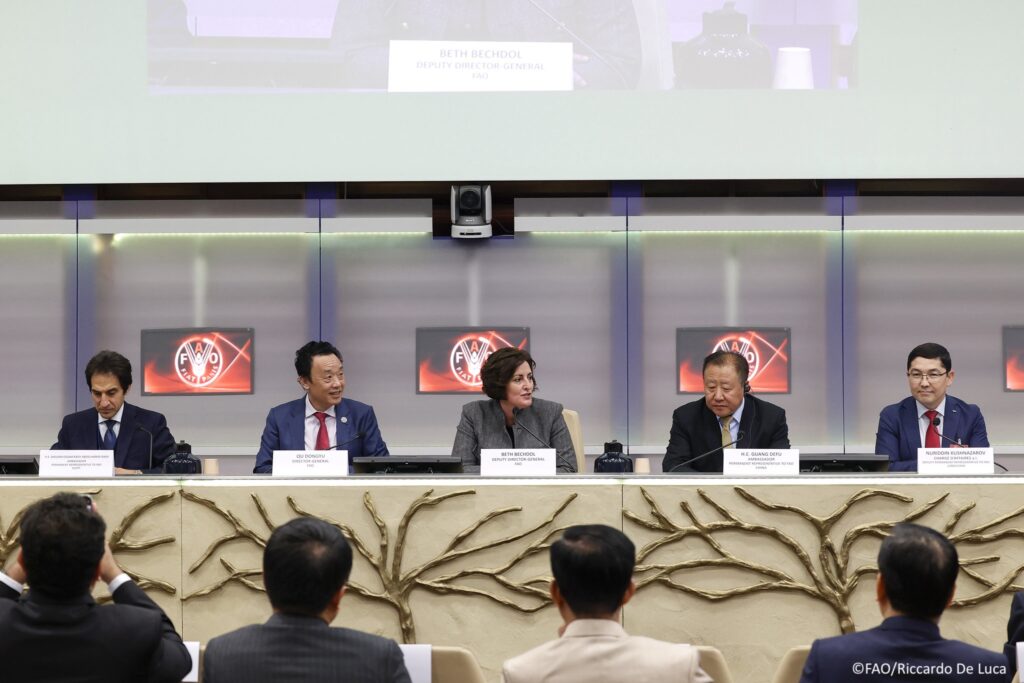Speakers highlighted that 15 OCOP demonstration countries under the global project will be able to showcase the impact of the collaboration and deliver tangible results.
From left to right, Permanent Representative of the Arab Republic of Egypt to FAO Bassam Essam Rady Abdelhamid Rady, FAO Director-General QU Dongyu, FAO Deputy Director-General Beth Bechdol; Ambassador and Permanent Representative of the People’s Republic of China to FAO GUANG Defu, Deputy Permanent Representative of the Republic of Uzbekistan to FAO Nuriddin Kushnazarov.
6 December, Rome – The Food and Agriculture Organization of the United Nations (FAO) marked a significant milestone on December 6 by officially launching a global project to support the implementation of the FAO One Country One Priority Product (OCOP) initiative under the framework of the FAO-China South-South Cooperation Programme.
This hybrid event took place at FAO Headquarters in Rome on the sidelines of the 174th Session of the FAO Council. As the largest single contribution to the OCOP initiative, China has provided $5 million to support this new global OCOP project under the FAO-China South-South Cooperation Programme, supporting capacity development and demonstration activities in 15 countries. These are Congo, Ghana, Lesotho, Malawi, and Tanzania in Africa; Bangladesh, Cambodia, and Samoa in Asia and the Pacific; Georgia and Uzbekistan in Europe and Central Asia; Chile, Mexico, and Trinidad and Tobago in Latin America and the Caribbean; and Egypt and Iraq in the Near East and North Africa.
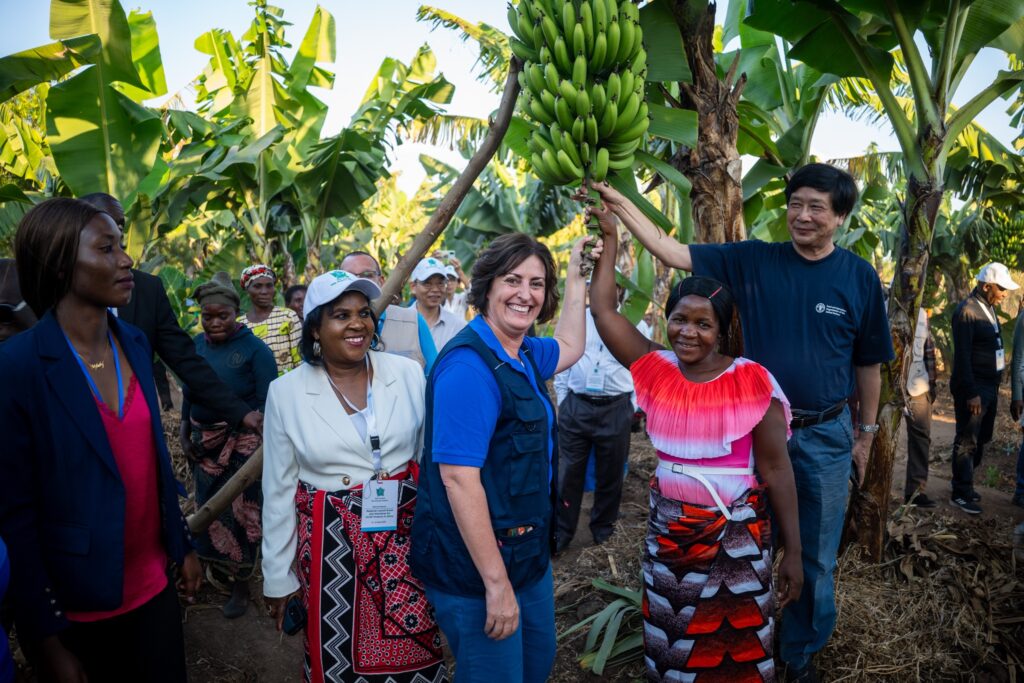 Country delegates, accompanied by FAO Deputy Director-General Beth Bechdol and Jingyuan Xia, Director of FAO NSP Division, interact with banana farmers during a field visit following the regional launch on the implementation of OCOP Country Projects in Africa held in Malawi in June 2023. Malawi has chosen bananas as its special agricultural product. ©FAO
Country delegates, accompanied by FAO Deputy Director-General Beth Bechdol and Jingyuan Xia, Director of FAO NSP Division, interact with banana farmers during a field visit following the regional launch on the implementation of OCOP Country Projects in Africa held in Malawi in June 2023. Malawi has chosen bananas as its special agricultural product. ©FAO
The FAO Director-General, Mr. QU Dongyu, emphasized the potential of the OCOP initiative, urging Members and stakeholders to contribute financial, technical, and human resources to support the implementation of the initiative, which can have a real impact on agrifood systems transformation.
“The OCOP initiative is a powerful catalyst for transformation and for accelerating progress in the implementation of the FAO Strategic Framework 2022-31, in support of the 2030 Agenda and the SDGs. In this regard, it supports FAO’s key objective of supporting members to achieve SDG 2—zero hunger,” he said.
This new OCOP global project will support countries in enhancing food production efficiency, reducing environmental and social impacts, maximizing benefits for farmers and food value chain actors, and promoting diversified food habits for improved food security and nutrition.
HE Mr GUANG Defu, Ambassador and Permanent Representative of the People’s Republic of China to FAO, formally announced the project and demonstration countries to be supported, stating that collaborative efforts among developing nations to foster agricultural products hold immense significance and promise for sustainable development.
“China is committed to sharing its experience, technology, and solutions with countries related to the OCOP initiative under the FAO South-South cooperation framework. Our aim is to promote the transformation of the global food system and agricultural development and make positive contributions to achieving the SDGs,” he said.
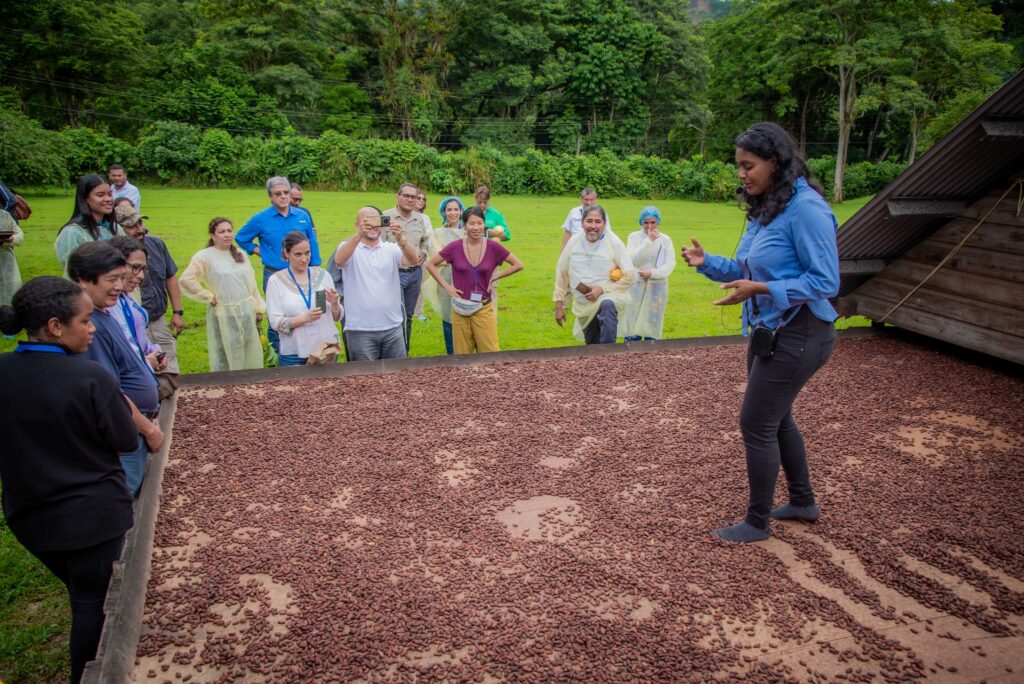 Delegates from the OCOP countries across Latin America and the Caribbean region visiting the facilities of the International Fine Cocoa Innovation Centre following the regional launch event on the implementation of OCOP country projects held in Trinidad and Tobago in August 2023. Cocoa is the special agricultural product of Trinidad and Tobago. ©FAO
Delegates from the OCOP countries across Latin America and the Caribbean region visiting the facilities of the International Fine Cocoa Innovation Centre following the regional launch event on the implementation of OCOP country projects held in Trinidad and Tobago in August 2023. Cocoa is the special agricultural product of Trinidad and Tobago. ©FAO
Country Experiences and Initiatives
During the event, representatives from participating countries highlighted the positive impact of the OCOP initiative on their agricultural sectors. Speakers included ministers as well as government officials and permanent representatives from Malawi, Bangladesh, China, Egypt, Trinidad and Tobago, and Uzbekistan.
The Honourable Sam Kawale, Minister for Agriculture of Malawi, highlighted the considerable improvement in productivity in the banana sector and the positive impact on people’s livelihoods due to OCOP interventions. “The Ministry has been able to support Farmer Field Schools and Community Based Facilitators with the aim of promoting green banana production under the initiative of OCOP,” he added.
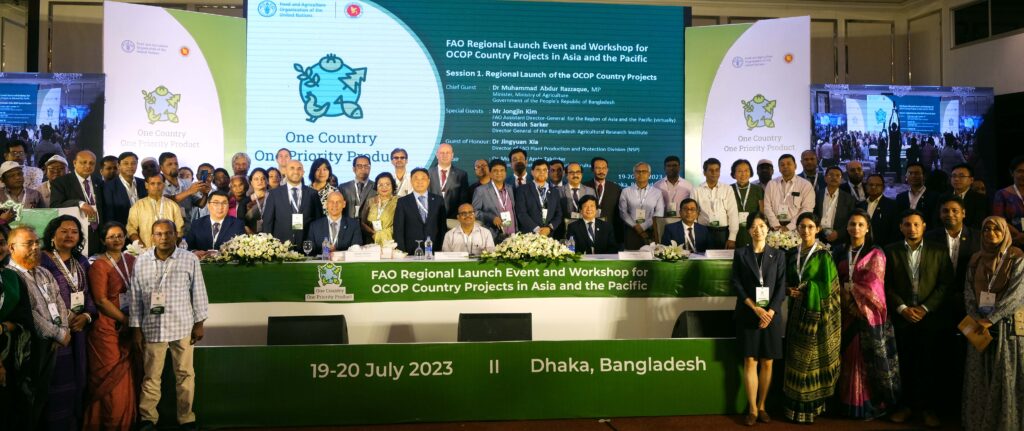 Group photo of the participants at the regional launch and workshop on the implementation of OCOP country projects in Asia and the Pacific held in Bangladesh in July 2023. ©FAO/Kazi Riasat
Group photo of the participants at the regional launch and workshop on the implementation of OCOP country projects in Asia and the Pacific held in Bangladesh in July 2023. ©FAO/Kazi Riasat
HE Mr Bassam Essam Rady Abdelhamid Rady, Permanent Representative of the Arab Republic of Egypt to FAO, highlighted the huge potential of Egypt’s date palm industry as the largest producer of palm dates in the world and appreciated the FAO support to strengthen the sector. “We look forward to working with FAO under the OCOP initiative, and we are proud of this partnership,” he said.
Senator the Honourable Avinash Singh, Minister, Ministry of Agriculture, Land, and Fisheries, Government of Trinidad & Tobago, mentioned that the ministry of agriculture, the Cocoa Development Company, and the Cocoa Research Centre conducted a study in 2023 focusing on the status of sustainability in the cocoa industry, supported by the OCOP initiative. “These initiatives will promote sustainable practices, attract local and foreign direct investment into the cocoa sector, and provide the coordinating mechanism for greening our wider production systems,” he hoped.
HE Ms Wahida Akter, Secretary of the Ministry of Agriculture, Government of Bangladesh, shared ongoing activities related to the OCOP initiative, including the establishment of an OCOP national task force. “We are on the way to develop an OCOP Action Plan and to formulate our development strategies, national programmes and sectoral plans for the green development of special agricultural products—jackfruit.”.
HE Mr Nuriddin Kushnazarov, Deputy Permanent Representative of the Republic of Uzbekistan to FAO, detailed efforts under the OCOP initiative to develop the value chain of sweet cherries, Uzbekistan’s special product.
“On-site training-workshops have been organized for more than 400 sweet cherry producers across the country. They analysed the current situation and conducted capacity-building activities on production, cultivation, and creating a value chain,” he said.
Progress Updates and Future Plans
Mr Hafiz Muminjanov, Global Coordinator, OCOP Secretariat, FAO, provided updates on the progress of the implementation of OCOP globally and outlined the future plans.
In her closing remarks, Ms. Beth Bechdol, FAO Deputy Director-General, expressed gratitude to the People’s Republic of China for its vital support to the OCOP initiative. She mentioned that FAO will work with partners to mobilize resources so that all 83 OCOP countries can be supported. “We are committed to strengthening the partnership both internally with other FOA initiatives and also doing our best to mobilize the remaining needed financial, technical, and human resources to achieve the goals,” she said.
Speakers highlighted that 15 demonstration countries under the global project will be able to showcase the impact of the collaboration and deliver tangible results. Members and relevant stakeholders were called to actively support, participate, and promote its implementation.
The hour-long event, moderated by Ms. Beth Bechdol, saw the participation of around 500 online and in-person attendees, reflecting the global interest and commitment to transforming agrifood systems.
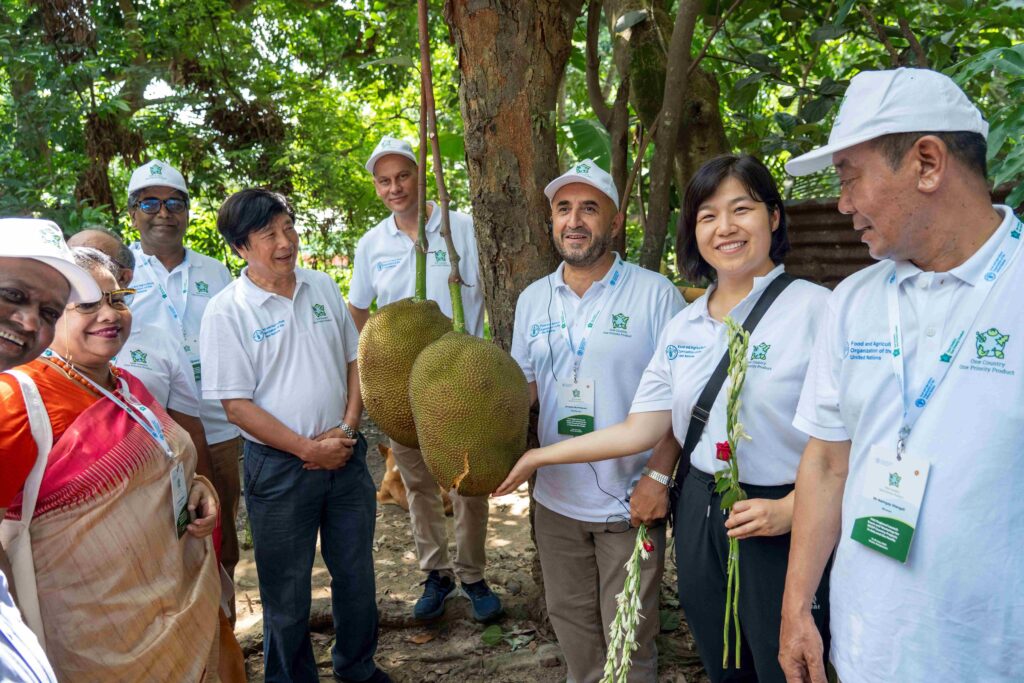 OCOP Secretariat members and delegates during a field visit to Bangladesh in July 2023. Jackfruit is the special agricultural product of the country. ©FAO/Saikat Majumder
OCOP Secretariat members and delegates during a field visit to Bangladesh in July 2023. Jackfruit is the special agricultural product of the country. ©FAO/Saikat Majumder
Originally posted by FAO. To access the original article, please click here.

